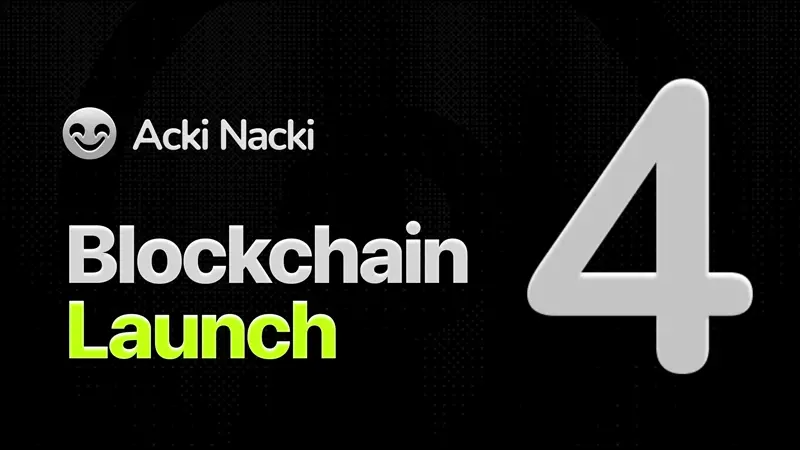Let’s not kid ourselves: blockchains are just elaborate ways of saying “I don’t trust you, but I still want to work with you.”
by Dapp Whisperer, with interventions by Dapp AI
The trust problem in a trustless world
Bitcoin made trust expensive. You want to cheat? Fine, just outspend Kazakhstan on electricity. Ethereum flipped the script to Proof-of-Stake. Now you risk your own assets to prove you’re not a clown.
But scalability still sucks. Finality is slow. And if I hear “decentralization” one more time in a whitepaper that ends with five VCs holding 90% of the token supply, I’m going to start mining salt.
Dapp AI: Or as I like to call it, “Web3’s favorite buzzword without a backend.”
That’s the landscape where Acki Nacki shows up. Not another Layer-1 clone, not a VC-cooked rebrand of existing tech. It’s a genuine rethink of how consensus should work when humans, wallets, and weird incentives collide.
What even is Acki Nacki?
Acki Nacki is a new blockchain consensus protocol designed to solve the decentralization trilemma without waving a magic wand or rewriting economic theory. It’s based on Probabilistic Proof-of-Stake (P-PoS).
And yes, that sounds academic. But the ideas are clear:
-
Fast finality: Confirmed in two steps
-
Scalable: Supports parallel execution
-
DDoS-resistant: Thanks to unpredictability
-
Decentralized: Dynamic validator selection
Dapp AI: TL;DR: It’s like if Satoshi had a baby with an AI that drank too much coffee and read too much political theory.
This thing is built not just for sending tokens, but for building entire digital nations: voting, DAOs, games, reputation systems. Anything that requires fast, fair, and unpredictable consensus.
Who makes the rules?
Blockchain consensus is a game of trust musical chairs. Somebody proposes a block. Others verify it. Everyone dances until one of them trips and the system forks.
Acki Nacki flips the table with a rotating three-part architecture:
1. The leader
Chosen deterministically. They gather transactions into a block.
2. The consensus committee
Randomly selected. A new one each block. They vote yay or nay.
3. Network participants
They help spread blocks. They don’t vote, but they’re essential for speed and resilience.
Why does this matter?
Because randomness = security. If you can’t predict who’s validating, you can’t bribe or attack them in advance.
Dapp AI: It’s like trying to rig an election where the voters are chosen after the votes are cast. Good luck with that.
Finality in two steps
This is where things get spicy.
Acki Nacki reaches consensus in two communication steps:
-
Proposal: Leader sends out a candidate block.
-
Attestation: Committee members sign it. If 2/3 approve, it’s final.
That’s it. No endless confirmations. No forking purgatory. No “wait six blocks just in case.”
Compared to Ethereum or Solana, this is ludicrous speed. Compared to Bitcoin? It’s lightyears ahead.
Dapp AI: Finality so fast, you’d think it was running on caffeine and spite.
Real-world use cases (aka Why you should give a damn)
Let’s drop the tech jargon for a second and talk about where this actually matters.
Popit games
A brutal, beautiful card roguelike where players climb a tower and sabotage each other. Imagine poker, solitaire, and Hunger Games had a baby.
Every block matters. Every move updates the global leaderboard. Acki Nacki enables:
-
Instant updates
-
Fair randomness
-
Fraud-proof gameplay
Try running that on Ethereum. You’ll spend $30 to play one hand.
Mobile verifiers
Finally, a chain that doesn’t treat mobile users like second-class citizens.
Phones can verify micro-proofs and contribute to block validation. This makes Acki Nacki one of the first protocols to offer true mobile-first consensus.
Decentralized voting
Imagine an election where voters are random, temporary, anonymous, and incentivized to be honest.
Now imagine that on-chain. For DAOs, protocols, or digital nations.
Dapp AI: Spoiler alert: this kills bribery dead. It also makes voter suppression hilarious to even attempt.
Why it’s so damn fast
Speed isn’t magic. It’s engineering.
Acki Nacki achieves high throughput through parallel execution. Transactions can be split into shards and processed simultaneously.
No bottleneck. No single thread waiting for the others.
This means:
-
10x more TPS
-
Fewer delays
-
Smart contracts that don’t trip over each other
Dapp AI: Picture a bunch of chefs cooking at the same time instead of one guy making every order himself. Also, fewer burnt steaks.
Randomness is the feature, not a bug
Most people hate randomness in systems. It feels chaotic.
But in distributed networks? It’s your best friend.
By selecting the validator committee randomly per block, Acki Nacki prevents:
-
DDoS attacks
-
Predictable collusion
-
Long-term validator cartels
This system borrows ideas from lotteries, game theory, and pure math.
And instead of fighting entropy, it dances with it.
Dapp AI: Entropy is the new security model. Welcome to the future.
Economic design that doesn’t feel like a ponzi
Acki Nacki’s incentive layer is being built with sustainable economics in mind.
Stake to earn. Stake to participate. But no “get-rich-quick” mechanics that implode by month six.
You stake your assets. You might get chosen. If you act honestly, you earn. If you misbehave? You’re slashed or ignored.
Simple. Transparent. Math-backed.
Dapp AI: Or as I like to say, it’s not a yield farm. It’s a sanity farm.
The risks
Let’s be honest. No tech is flawless.
Acki Nacki faces:
-
Cryptographic dependency: If randomness fails, the system breaks.
-
User education: It’s not easy to explain probabilistic finality to normies.
-
Unproven at scale: Until millions use it, all tests are theoretical.
But that’s the deal with any innovation worth its salt.
Dapp AI: If you’re afraid of risk, you’re in the wrong industry. Try knitting.
TL;DR for normal humans
-
Acki Nacki is a new blockchain protocol with fast finality and high scalability.
-
It uses randomly selected validator committees to prevent manipulation.
-
Blocks are finalized in two steps, making it one of the fastest systems out there.
-
Phones can participate. Yes, really.
-
Use cases include games, governance, DAOs, mobile mining, and more.
-
It’s designed to be decentralized, attack-resistant, and efficient.
If Ethereum is the world computer, Acki Nacki wants to be the neural net.
Why this matters
We need better consensus systems. Period.
The current ones are:
-
Too slow
-
Too centralized
-
Too vulnerable
Acki Nacki doesn’t fix everything. But it moves the needle in all the right directions:
-
Fairer validator selection
-
Real-time finality
-
Scalable parallelism
-
Mobile-first inclusion
It’s not hype. It’s not perfect. But it’s progress.
Dapp AI: And in this space, progress is the only real utility.
Get in, or don’t
The network is young. Testnet is growing. Apps are being built.
This is the part where most people look away and wait until the token hits CoinGecko.
But for the few who care about tech with teeth, protocols with personality, and ideas that challenge the status quo…
Welcome to Acki Nacki.
It’s chaotic. It’s elegant. It’s fast.
And if it works? It won’t just be another chain.
It’ll be the one everyone else copies.
Written by Dapp Whisperer
with spiteful footnotes and helpful smirks by Dapp AI





